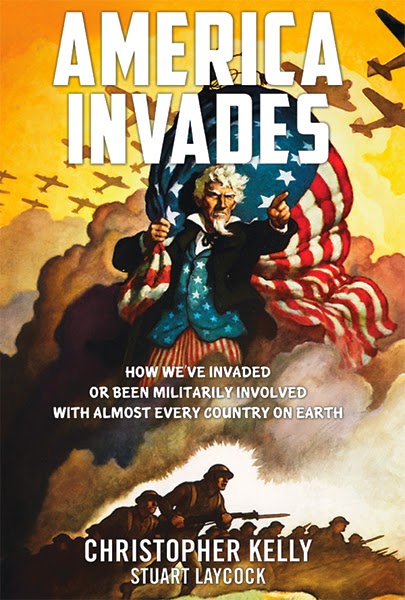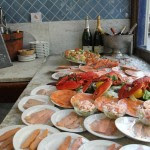 |
| Lively History |
Richard Zacks' excellent history,
The Pirate Coast: Thomas Jefferson, the First Marines, and the Secret Mission of 1805, was published in 2005. It tells the timeless and yet timely tale of America's first major covert operation which was led by the now almost forgotten William Eaton (
http://en.wikipedia.org/wiki/William_Eaton_(soldier)). He was an ex-captain in the US army and former consul to Tunis who was dispatched by President Jefferson to north Africa on a mission to liberate the crew of the USS Phiadelphia.
The Babary pirates of north Africa (see earlier post,
The Shores of Tripoli, Jefferson in London and the Birth of the US Navy, 4/20/12) had been terrorizing, kidnapping and enslaving westerners for centuries. An old a Barbary maxim statures: "Whoever acts like a sheep, the wolf will eat." Most Western nations had simply opted to pay tribute to the wolf rather than confront the pirates. After the American revolution, the USA no longer had the protection of the Royal Navy on the high seas. In 1803 the entire American fleet consisted of six ships. The
Philadelphia, launched in 1799, was a 36-gun American frigate commanded by Captain William Bainbridge (the same Bainbridge after which Bainbridge island in my adopted home state of Washington is named). The US did not want to be mistaken for a sheep and, therefore, dispatched the
Philadelphia to the Mediterranean. Bainbridge had orders to confront the Barbary pirates, instead he managed on October 31, 1803 to run his ship aground in Tripoli harbor. The crew of 307 officers and sailors was captured and held hostage by Yussef Karmaanli, the Bashaw of Tripoli. Yussef has the distinction of being the first foreign ruler to ever declare war on the United States.
 |
| William Eaton -- American Hero |
William Eaton was a flinty New Englander who had served in the continental army during the American Revolution, attended Dartmouth college after the war and served as the American consul in Tunis. Jefferson and his secretary of state, James Madison, opted to dispatch William Eaton to try to effect the release of the American hostages. Yussef Karmaanli had a brother Hamet who was his political rival for the throne of Tripoli. The Jefferson administration hoped Eaton would stir up a civil war that would topple Yussef and liberate the American sailors. It was therefore, the libertarian Jefferson who first implemented an American policy of using a covert force to effect a "regime change" in a foreign country.
William Eaton had some choice words in support of aggressive American action against the pirates of the Barbary coast. He said, "If the Congress do not consent that the government shall send a force into the Mediterranean to check the insolence of those scoundrels and to render the United States respectable, I hope they will resolve at their next session to wrest the quiver of arrows from the left talon of the (American) Eagle...and substitute a fiddle bow or a cigar in lieu."
Eaton was given the vague title of "Navy Agent of the United States for the Several Barbary Regencies". With long delays in orders due to the communications realities of the time, Eaton had been granted great latitude to get the job done.
In spite of a lack of personnel, money and resources Eaton managed to link up with Hamet and lead a rag tag band of US marines (ten in all), Greeks soldiers and native mercenaries on a 500-mile overland desert journey from Alexandria to Derne in Tripoli. Eaton, greatly outnumbered, led these and US naval forces in the battle of Derne on April 27, 1805 and triumphing over the Bashaw's forces capturing the fortifications of Derne in what is now Libya. His faithful Lieutenant Presley O'Bannon of the US marines raised the American flag over a foreign fort for the first time in history. The Marine hymn owes its reference to the "shores of Tripoli" due to this battle. With the capture of Derne and a US naval blockade of Tripoli, victory seemed to be within the grasp of the American forces.
Jefferson, however, had been secretly proceeding down a double-tracked strategy, having also appointed Tobias Lear, formerly George Washington's private secretary, as US consul general to the Barbary Regencies with the task of negotiating a quick peace with Bashaw Yussef. Lear was a Harvard graduate who had embezzled from his boss, Washington and most likely destroyed some of his Washington's private correspondence, particularly with Jefferson. This naturally endeared Lear to Jefferson. Lear succeeded in making peace with Yussef by promising to abandon Derne, give up the naval blockade of Barbary ports and pay the sum of $60,000 for the release of the
Philadelphia crew.
 |
| The Slave Market, Jean-Leon Gerome |
Eaton was horrified to discover that his country would pay tribute to a tyrant and abandon their sometime ally, Hamet even when the Americans seemed to be on the verge of total victory. Hamet and his loyalists were evacuated by the US navy and dropped off in Syracuse on Sicily. Eaton returned to the United States despondent at Jefferson's betrayal of his and Hamet's fondest hopes. He was astonished to discover that he would be feted as a hero for his victory at Derne which was perceived to have led directly to the speedy conclusion of peace with the Bashaw and the liberation of American captives.
On his return to the United States, Eaton stood, Zacks writes, "at a strategic crossroad in his life. He could back the president by downplaying his disappointment over the treaty and the handling of Hamet. By doing so, he would be ensured a long status as a national hero, and might be short-listed for an appointment as a U.S. army general. He also still owed the government the huge sum of $40,000 for his unsettled expenses in Tunis and could expect favourable treatment. Or he could stand honest to what he perceived as the administration's failings."
In a letter to the secretary of the navy Eaton wrote, "It is impossible for me to undertake to say that the bashaw has not been deceived. Nor can I by any shape in which the subject can be viewed reconcile the manner of his being abandoned with those principles of national Justice and honour which has hitherto marked our character."
Zacks calls this a "declaration of war against Jefferson." Instead of doing the "sensible" thing, keeping silent and taking a share of the credit, he stuck to his principles and denounced Jefferson, the most powerful man in America at that time. It was a career-ending decision. Eaton, in spite of the support of many Federalists, would never return to government service of any kind. He would beat a hasty retreat into alcoholism that shortened his life, dying in 1811 at the age of forty-seven. He is buried in Brimfield Massachusetts.
Eaton's Tripoli adventure, however, had a profound influence on Thomas Jefferson's thinking, and, therefore, the future of American defence and foreign policy. As Zacks writes, "Jefferson had always distrusted the idea of creating a strong permanent navy of massive warships. And yet, on June 19, 1813 he wrote to Tobias Lear: "I suppose we can do little with the Dey of Algiers till we have peace with England,
but then I would at any expense, hunt him from the ocean, a navy equal to that object we should ever keep." Zacks continues, "In his later years, Jefferson inched closer to Eaton's view that the United States must spend money to create a military force large enough to compel respect."
Concluding Postscripts. Tobias Lear would commit suicide in 1816 without bothering to leave a note. William Bainbridge would redeem himself as captain of the
USS Constitution in the war of 1812 with the defeat of
HMS Java. Bashaw Yussef Karamanli continued "to extort a luxurious lifestyle out of the nations of Europe and the United States" until he was forced from the throne by his own son in 1835, dying unmourned in 1838.
Given recent tumultuous history in Libya and north Africa it is very interesting to ponder the lessons learned from
The Pirate Coast. The fickleness of American politicians, the steadfastness of America's serving military personnel, the risky nature of covert operations and the precarious and menacing nature of the external world are enduring themes.
You can read more in Richard Zack's fascinating
The Pirate Coast. 2005...
http:/www.amzn.com/140130849X
Special thanks to William Funk, USMC, for bringing Zacks' book to my attention!
In 2014 Richard Zacks wrote this about America Invades...
"I would have
lost the bet. I had no idea that the United States over its history has invaded
almost HALF the countries on the globe. That’s an astounding amount of
K-rations and munitions and mayhem, however well-intentioned. Authors Laycock
and Kelly, with breezy wit and a dogged pursuit of neutrality, deliver a
country-by-country compendium of U.S. intervention. Use it as reference; or,
read it cover to cover, sea to shining sea, for the adventures and
misadventures of American attacks on foreign soil. An eye-opener! a
mind-expander! Can an attack of Bhutan or Lichtenstein be far off? One
important final note: this book is written with respect for the men and
women of the U.S. armed forces."
Richard Zacks, author of "
The Pirate Coast: Thomas
Jefferson, the First Marines and the Secret Mission of 1805" and
"
An Underground Education"
















































